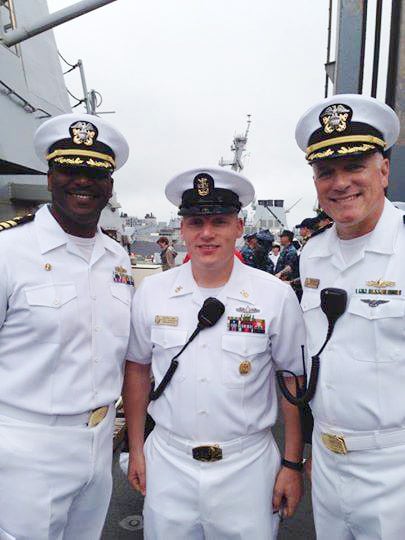A former destroyer executive officer disciplined in October spoke out against the Navy's findings spoke out for the first time Tuesday, blasting his chain of command The disgraced former executive officer of the destroyer James E Williams released his first extensive public statement Tuesday, calling out his chain of command for an investigation and subsequent punishment that was "deeply flawed and full of inconsistencies."
Cmdr. Ed Handley, who was taken to mast and punishedissued a punitive letter of reprimand for what investigators concluded foundclaimed was a poor command climate on the deployed destroyer James E. Williams, which he left weeks before a suicide on boardearlier. Handley ship, took to Facebook to defend himself after his formere' commodore at Destroyer Squadron 2 gave an interview to The Virginian-Pilot newspaper on his case.
His nearly 2,000-word statement is was a searing indictment of the handling of his case; it is also a risky move for an officer who's attempting to clear his name and save his 33-year career through appeals and independent reviews.Handley blasted away at both the investigation and the officers who signed off on the investigation.
"The command investigation is deeply flawed and full of inconsistencies," Handley wrote. "The conclusions are circumstantial and are pure speculation. In the CI, the opinions are not supported in any way by the cited findings of fact."
In his public statement, Handley vigorously denied that he knew about the alleged misbehavior by alcohol-related incident involving Command Master Chief Travis Biswell cutting up in a bar in Norway. He also called into questioned how he could be charged with not acting on an incident that wasn't investigated or verified.
"I was found guilty for failing to address the CMC's alleged alcohol problem and to provide forceful backup based on an email from another ship CMC, based on a report from another sailor on another ship, that was brought up to CDR Calloway and I by our CMC," he wrote, referring to Cmdr. Curtis Calloway, the ship's then-CO. "We are being held responsible for a self-reported, third-hand report from a sailor in another command."
In the interview, Capt. Fred Pyle stood by his decision to issue Handley and along withcommanding officer Curtis Calloway punitive letters of reprimand.

Cmdr. Curtis Calloway, Command Master Chief Travis Biswell and Cmdr. Ed Handley on May 30, 2014, the day the James E. Williams deployed.
Photo Credit: U.S. Naval Institute
"There was not a climate of dignity and respect. There was not a climate of safety on board," Pyle told the Pilot in an interview. "There was a possibility of mission failure here based on the climate on the ship."
When Asked to address Handley's assertions of unfair treatment, to respond to the statement made by Handley, Naval Surface Force Atlantic spokesman Lt. Cmdr. Jereal Dorsey said declined, saying "the Navy provided an official response to CDR Handley's statement regarding his NJP during the appeal process" and declined to comment further.
Handley argues through for an officer who's In it he claims both he and Calloway requested court-martial instead of submitting to NJP, but were denied. The Navy claims he was not allowed to request court-martial because he was attached to a sea-going command.
But Handley countersclaims he was not receiving sea pay and was temporarily reassigned, therefore he should have been eligible; he was in the commanding officer training pipeline until his reassignment in SeptemberOctober.
"I had 10 former senior JAG lawyers review this and each and every lawyer said we were eligible for the court-martial," he wrote. "It is worthy to note, in court-martial, the rules of evidence apply, but in NJP proceedings the rules of evidence do not apply. By taking us to NJP, Pyle did not have to have tangible evidence."
Handley also contrasted his case with that of the current XO, Cmdr. Chad Fella, who further questions why he was held accountable for the command climate but the current XO, Cmdr. Chad Fella, only received a letter of instruction. Fella was XO at the time of during the suicide of Boatswain's Mate Seaman Yeshabel Villot-Carrassco's suicide and the subsequent liberty incidents that investigators citedlaimed aswere evidence of a bad command climate.
"My charge is … a relatively minor charge," Handley wrote. "The officer that relieved me as XO was present during all the events over the three months that initiated the CI, but he was only given a Letter of Instruction. … This is a disproportionate punishment for my charge and a double-standard in awarding punishment between two officers.
Among Handley's other claims:
- Pyke was hypocritical for citing him in the investigation for a "heavy-handed" leadership style because the DESRON 2 commodore had sat on Handley's command screening board and recommended him only months earlier.
- The ship's high operational tempo was intense — including a Board of Inspection and Survey, work-ups, multinational exercises in Europe, followed by deployment — and he blamed it, in part, for the incidents. suggests it is more responsible for the incidents.
- The crew's of James E. Williams' morale is low and many of its junior officers are either seeking to get out or are seeking lateral transfers.
A lawyer who read Handley's statement said the publicly leveled criticisms were risky because they were sympathetic to his sentiments but that making those kinds of comments should be left to lawyers because they open him up to more backlash from his command.
"While I agree with a lot of the sentiments stated there, it's not a statement I would have advised him to make publicly while [the case is] still pending," said Tim Parlatore, a former surface warfare officer who is now a defense attorney in Manhattan. "There is a big difference between what a client and an attorney can say."
David B. Larter was the naval warfare reporter for Defense News.





